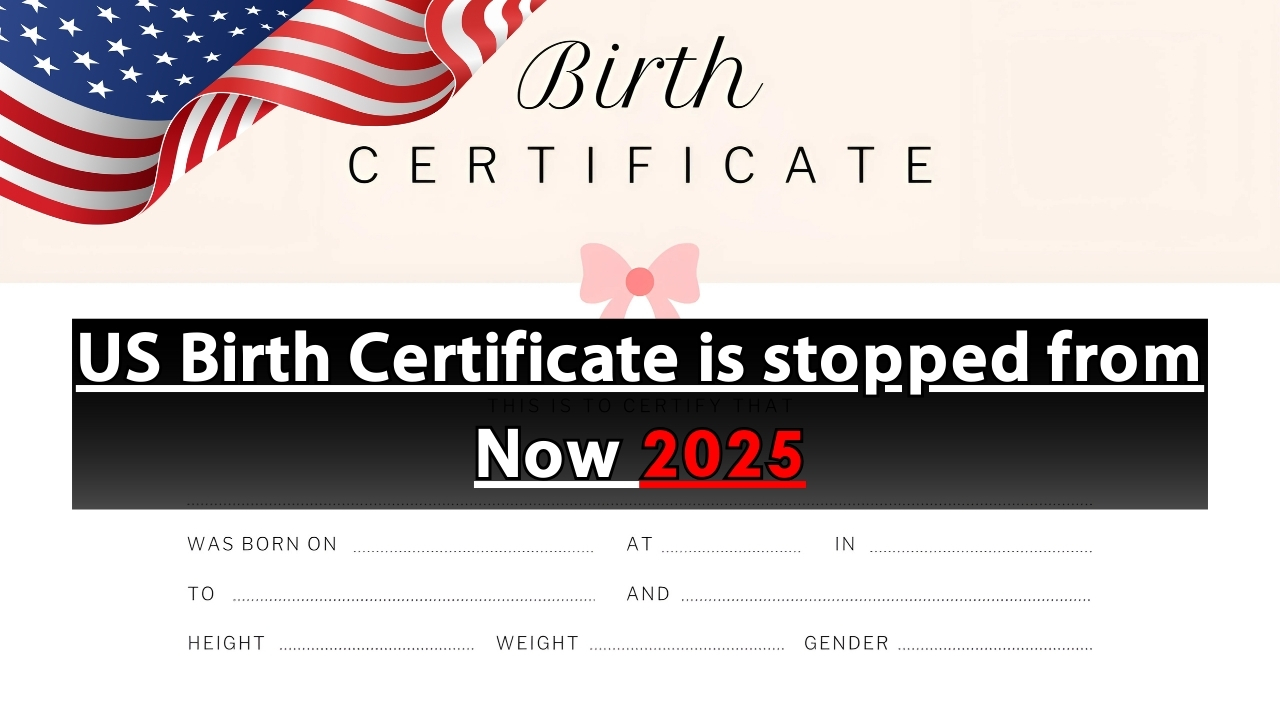US Birth Certificate : In a surprising turn of events, the United States has implemented significant changes to its birth certificate policies in 2025.
These alterations have far-reaching implications for citizens, immigrants, and the very fabric of American identity.
This article delves into the details of these changes, their potential impacts, and the controversies surrounding them.
US Birth Certificate The Executive Order: A Paradigm Shift
On March 25, 2025, President Donald Trump signed an executive order titled “Preserving and Protecting the Integrity of American Elections.”
While the order’s name suggests a focus on electoral processes, it contains provisions that directly affect birth certificate policies across the nation.
Key Changes to Birth Certificate Policies
-
Proof of Citizenship Requirement: The most significant change is the new requirement for individuals to provide official proof of US citizenship when registering to vote. Acceptable documents include US passports or birth certificates.
-
Federal Agency Data Sharing: The Department of Homeland Security and other federal agencies are now required to share data with state officials to identify non-citizens on voter rolls.
-
Stricter Name Matching: The order mandates that citizenship documents must exactly match the name on a current photo ID. This poses potential challenges for individuals who have changed their names, particularly married women.
-
Birth Certificate Updates for Transgender Individuals: The order has implications for transgender individuals seeking to update their birth certificates, potentially making the process more difficult.
US Birth Certificate Implications and Controversies
Voter Disenfranchisement Concerns
Critics argue that these new requirements could lead to widespread voter disenfranchisement. Richard Hasen, an election law expert at UCLA, stated, “This would prevent only a tiny amount of noncitizen voter registration but stop millions of eligible voters, who do not have easy access to documents such as passports, from registering to vote.”
US Birth Certificate Impact on Married Women and Name Changes
The strict name-matching requirement poses particular challenges for individuals who have changed their names, especially married women.
Congresswoman Jasmine Crockett expressed concern, saying, “This hits married folks who change their names, disaster survivors who lost paperwork, and so many others. This ain’t about security—it’s suppression.”
US Birth Certificate Challenges for Transgender Individuals
The new policies may create additional hurdles for transgender individuals seeking to update their birth certificates.
This comes at a time when several states are already implementing restrictions on gender marker changes.
US Birth Certificate State-Level Responses and Variations
While the executive order sets federal guidelines, individual states retain some autonomy in implementing these changes. This has led to a patchwork of policies across the country.
Progressive State Initiatives
Some states, like Maryland, are considering legislation to streamline the process for updating birth certificates, particularly for transgender individuals.
The proposed Birth Certification Modernization Act aims to create a more consistent and less burdensome process.
Conservative State Actions
Other states are aligning closely with the federal guidelines, with some even considering more stringent measures.
For example, Texas legislators have filed a bill that would make identifying as transgender a felony punishable by jail time.
US Birth Certificate The Role of Federal Agencies
Department of Homeland Security
Under the leadership of Secretary Kristi Noem, the Department of Homeland Security is tasked with ensuring states have access to systems capable of verifying citizenship or immigration status for voter registration.
Department of Government Efficiency
A newly created department led by Elon Musk is involved in reviewing state voter registration lists to ensure compliance with federal standards.
Legal Challenges and Constitutional Questions
The executive order has already faced legal challenges from various organizations and state governments.
Colorado Secretary of State Jena Griswold called the order “unlawful,” stating that it would “prevent eligible Americans from exercising their sacred right to vote.”
Constitutional law experts are debating the extent of executive power in implementing such sweeping changes to election and identification processes.
US Birth Certificate Economic Implications
Federal Funding Conditions
The executive order ties federal election funding to compliance with the new requirements.
This could place significant financial pressure on states, especially those that currently allow more flexible voting procedures.
Cost of Implementation
States and local governments are grappling with the potential costs of implementing these new policies, including updating systems, training staff, and potentially issuing new identification documents to citizens.
International Reactions
The international community has closely watched these developments, with some nations expressing concern about the potential impact on democratic processes in the United States.
Human rights organizations have raised alarms about the potential for discrimination and disenfranchisement.
US Birth Certificate Looking Ahead: The Future of American Identity
As the nation grapples with these significant changes to birth certificate policies and voter registration requirements, questions arise about the future of American identity and citizenship.
Potential Long-term Impacts
-
Changing Demographics: These policies may influence population statistics and demographic reporting.
-
Civic Engagement: There are concerns about how these changes might affect voter turnout and overall civic participation.
-
Legal Precedents: The outcomes of legal challenges to these policies could set important precedents for future identity and voting rights cases.
US Birth Certificate Conclusion
The 2025 changes to US birth certificate policies represent a significant shift in how the nation approaches questions of identity, citizenship, and voting rights.
As states implement these federal guidelines and courts weigh in on their legality, the full impact of these changes remains to be seen.
What is clear is that these policies have ignited a fierce debate about the balance between election security and voter accessibility, a conversation that is likely to shape American politics for years to come.
As citizens, policymakers, and legal experts continue to grapple with these changes, it is crucial to stay informed and engaged in the ongoing dialogue about the future of American democracy and identity.
Also Read This-
-
10 Extraordinary Pennies coins value around $80 Million each – Check it
-
Rare Bicentennial Quarter coins circulate in market with worth $38 Million, Check your pocket now
-
$401k Contribution limits is increasing to $23,700 in April 2025, Check who get this
